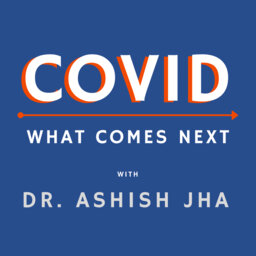Welcome to Episode 36 of “COVID: What comes next,” an exclusive weekly Providence Journal/USA TODAY NETWORK podcast featuring Dr. Ashish Jha, dean of the Brown University School of Public Health and an internationally respected expert on pandemic response and preparedness
PROVIDENCE – The microbe that causes coronavirus disease may never disappear entirely, but there is an “end game” in sight for the pandemic, which means “we're going to get through this and we will get back to a normal that people will value and appreciate and love.”
And that could be as soon as the year 2022.
That was the prognosis Tuesday from Dr. Ashish Jha, dean of Brown University’s School of Public Health, speaking during a recording of the “COVID: What Comes Next” podcast.
“We still have a lot of work to do, but the bottom line is if you think about the tools necessary to bring this pandemic to an end, we have them all,” starting with safe and effective vaccines, Jha said.
“Thinking about what the long-term looks like,” the scientist continued, “we are going to live with this virus. We're not going to eradicate it, but hopefully we can suppress it to very, very low levels. The 1918 flu pandemic was caused by this H1N1 influenza. That virus is still around, but it just doesn't cause much illness anymore.
“So I would not be a bit surprised if the SARS-CoV-2 virus that causes COVID-19 is around forever. My hope is at very, very low levels. My hope is that most of us have immunity either from vaccines or from infections and that the infection levels are very low and then we do some things for a while to keep infection levels low, like have regular widespread testing and improve indoor air quality and occasionally, if there's an outbreak, put on masks…
“The other thing that will help speed up this end game is if we get better treatments, which will also make it less serious.”
Bottom line?
“I think 2022 is going to be a much, much better year for all of this,” Jha said.
During taping of this 36th episode of the podcast, available exclusively from The Providence Journal and the USA TODAY NETWORK, Jha also said he suspects that the autumn months for the nation as a whole will be better than some who have been following the spread of the delta variant are predicting.
“There's an old line by Yogi Berra that predictions are hard, particularly about the future,” Jha joked, “but I'm going to make one which is: I think we as a country have peaked in our infection numbers. We had this very dramatic rise in cases all through the summer and I think in the last couple of weeks, it really looks like we've peaked.”
Regional differences remain.
“The infection numbers in the South really have started coming down,” Jha said. “When I look out to California, it's stabilized and coming down. New York is coming down. The Midwest and the Great Plains I still worry about; I can see infection numbers rising. Here in New England, infection numbers seem to have pretty much flattened over the last week to 10 days.”
Nonetheless, Jha said, nationally “we still have enormous numbers of people getting infected: 140,000 and 150,000 a day, down from 175,000, but still high.”
Deaths and hospitalizations remain unacceptable, the scientist said, “so I don't mean to paint a rosy picture of ‘sunny days are here again’ and everything is great. We have lots of challenges especially as we look to the fall, but I think the peak of this wave has crested and now we've got to figure out how to get it down quickly.”
Jha responded to questions The Journal has received regarding the safety of large indoor gatherings, asserting that “we have the tools to do indoor concerts and conferences, but they're complicated… You've got to work harder to make those events safe.”
He gave the example of a two-day indoor academic conference, saying “the first thing I would do is do a vaccine mandate: ‘Sorry, you can't come and spend two days indoors with a lot of people if you're not vaccinated,’ Second, I would add some rapid testing on top of antigen testing. They're cheap. They're relatively easy and I would get everybody tested upon arrival. I don't think once you've done that that you would need indoor masking.”
Proper ventilation also is key, Jha said.
The Brown dean said he approves of President Biden’s decision last week to use the federal Labor Department's Occupational Safety and Health Administration to implement a vaccine mandate or require regular testing for companies that employ 100 or more people.
“I think that's a very reasonable set of regulations,” Jha said, “one certainly backed by the science. It makes sense to me that the federal government can require that as a safety measure.”
On the topic of booster shots, Jha said it is likely that an advisory panel to the FDA in the next week or so will recommend third shots of the Pfizer and Moderna products for “high-risk people -- people who are over 65, people who have chronic diseases, certainly frail elders. My guess is, they're not going to recommend boosters for young healthy people, largely because it's really not clear that they are needed at all.”
As for the one-shot Johnson & Johnson vaccine, Jha said he hopes the FDA will provide guidance on it, too, and not just “say ‘you're on your own’ and not give any sense of a timeline for when they'll have answers… My hope is that when the FDA advisory committee meets in the next week, they address the J&J issue. If not, I'm happy to tell you what. I think the data [indicates] people are going to need an extra shot.”
In 1 playlist(s)
COVID: What comes next - With Dr. Ashish Jha
Long before COVID, Dr. Ashish Jha was an internationally respected expert on pandemic response and p…Social links
Follow podcast
Recent clips

Welcome to Episode 41 of “COVID: What comes next,” an exclusive weekly Providence Journal/USA TODAY NETWORK podcast featuring Dr. Ashish Jha, dean of the Brown University School of Public Health and an internationally respected expert on pandemic response and preparedness
07:50

Welcome to Episode 40 of “COVID: What comes next,” an exclusive weekly Providence Journal/USA TODAY NETWORK podcast featuring Dr. Ashish Jha, dean of the Brown University School of Public Health and an internationally respected expert on pandemic response and preparedness
11:21

Welcome to Episode 39 of “COVID: What comes next,” an exclusive weekly Providence Journal/USA TODAY NETWORK podcast featuring Dr. Ashish Jha, dean of the Brown University School of Public Health and an internationally respected expert on pandemic response and preparedness
12:23
 COVID: What comes next - With Dr. Ashish Jha
COVID: What comes next - With Dr. Ashish Jha